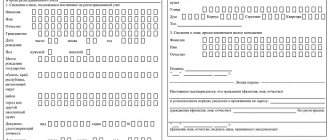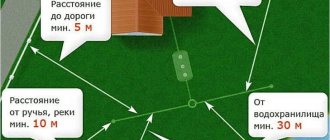Types of registration/registration
The conditions for the acquisition and renewal of registration are regulated by Decree of the Government of the Russian Federation No. 713 of July 17, 2015 and Order of the Ministry of Internal Affairs of the Russian Federation No. 984 of December 31, 2017.
Temporary registration/registration
Russian citizens are not legally prohibited from staying at a location other than that indicated in their passport.
The obligation to provide information about their whereabouts arises if the period of stay is more than 90 days. It is possible to obtain registration for any period, which is determined independently by the owner of the property and the person being registered.
An exception is registration in municipal residential premises; it is granted for a period of no more than six months.
After the specified date, urgent registration ceases to be valid from the next day.
Permanent residence/registration
Information on permanent registration at the place of residence with an exact indication of the location is affixed to the civil passport in the form of a stamp.
Persons must report any change in their location (moving to another Russian region, selling real estate or leaving their apartment) to the departments of the Main Directorate for Migration and Migration.
Reasons for refusal
The main problem may be refusal to provide rural registration. There cannot be an unreasonable refusal, so it must be explained in writing .
Frequent reasons for this may be: insufficient submission of documents, incorrect filling out of the application or non-compliance of documents with the requirements, etc. After correcting the shortcomings, you can register in the village without any problems.
A refusal may be issued due to the house's non-compliance with residential standards or its dilapidated, uninhabitable condition. In this case, you will have to look for another place to live and register.
Legal consequences of lack of registration
Ignoring notification of the state about a change of residence entails the imposition of penalties under Art. 19.15.1 of the Code of Administrative Offenses of the Russian Federation. This article establishes several types of fines:
- for lack of information about the registration of residents of the constituent entities of the Russian Federation (minimum amount - 2 thousand rubles, maximum - 3 thousand rubles);
- for failure to provide information by residents of federal cities (from 3 thousand rubles to 5 thousand rubles);
- for the lack of registration for home owners (for residents of the regions - the amount increases to 5 thousand rubles and up to 7 thousand rubles for owners of Moscow and St. Petersburg residential premises).
Officials have the right to apply penalties when an offense is detected. The time for registration of registration cannot exceed 7 days when changing permanent location and 90 days after arrival in another region.
Sample application
Drawing up an application is the main stage of registration.
Please note! The form must contain the following information:
- full name of the body to which the appeal is submitted;
- information about the applying citizen;
- information about the place of registration;
- applicant's passport details.
There should be no blots or typos in the application. Such a form will not be accepted for work.
Registration and ownership
Owners of residential premises are not required to register at the location of the property. Registration at the place of residence and the right to own (dispose of) housing are not related to each other. When a municipal apartment is privatized, registered citizens become its owners. When registering in housing owned by several people, it is necessary to obtain the consent of each owner. The exception is sole ownership of real estate.
Documents for registration of permanent registration in a private house
Registration by location of the house is possible upon submission of:
- statements;
- arrival sheet;
- proof of home ownership;
- passports of the owner and the registered person;
- birth certificates (if a minor is registered at the same time as his parents);
- house book;
- consent of all owners to register the applicant in a private house.
The application must be filled out legibly using a computer or by hand. Corrections and crossing out are not allowed.
The applicants are:
- citizens of the Russian Federation (upon reaching 14 years of age);
- legal representatives of minor children under 14 years of age (parents, guardians, trustees, adoptive parents) or incapacitated persons;
An application for receiving public services for registration at the address of a private house must be addressed to:
- to the nearest branch of the Main Department of Migration Affairs of the Ministry of Internal Affairs;
- to the administration;
- in the MFC;
- to the government services portal.
Documents for registration of temporary registration in a private house
To obtain urgent registration you must provide:
- applicant's passport;
- birth certificate (if the child is temporarily registered);
- a document confirming the powers of the legal representative (an act or decision of the guardianship authorities);
- house register (extract from the house register);
- consent of the owner and participants in shared ownership for the temporary residence of the applicant;
- documents confirming ownership of a residential building and land plot;
- passport of the owner of a residential building;
- arrival slip;
- application in the prescribed form.
An application for temporary registration with the necessary documents can be submitted:
- in person by contacting the migration department;
- through the State Services portal by filling out an electronic application form;
- through the multifunctional center.
Citizens of the Russian Federation who have reached 14 years of age, as well as legal representatives of children and incapacitated citizens (parents, adoptive parents, trustees, guardians) have the right to apply for temporary registration.
Documents for registration at the dacha
Registration of individuals at the location of their dacha is permitted by Federal Law No. 66-FZ of April 15, 1998. Also, registration of individuals is allowed on the territory of SNT (definition of the Constitutional Court No. 7-P dated April 14, 2008).
A dacha can be considered a residential building if it meets the requirements of Decree of the Government of the Russian Federation dated January 28, 2006 No. 47.
You may also be interested in the procedure for obtaining ownership of a house under the dacha amnesty.
Registration at the location of the dacha is carried out if:
- in proper order, the dacha is recognized as suitable for living and complies with sanitary standards;
- the dacha and land belong to the registered person or a member of his family;
- the land with the dacha is located within the boundaries of the settlement;
- the house is provided with engineering systems and can be used for year-round living;
- the dacha is the only place of residence.
To establish a dacha as a residential premises, a special commission is created, or a forensic construction examination is carried out (if established in court).
To register at the dacha you must provide:
- a document confirming that the dacha is a residential premises (conclusion of the interdepartmental commission, court decision);
- technical certificate;
- documents confirming ownership of the house and land;
- Russian passport of the applicant;
- a judicial act recognizing the house as residential, establishing the right of residence and registration on the dacha plot;
- certificate of marriage and birth of children (for registration of family members).
Registration in a house with shared ownership
It is possible to register a citizen in a house owned by shared ownership by several persons only with their consent.
Registration in an unfinished house
An unfinished house cannot meet the conditions for recognizing it as a residential premises in accordance with Art. 15 of the Housing Code of the Russian Federation, since the necessary conditions are not met:
- may not have doors or windows;
- not equipped with utility systems;
- no address assigned;
- not put into operation.
Since registration rules only allow registration in residential premises, registration in unfinished premises is not possible.
Where to contact
Documents for registration are accepted by the FMS or the passport office as part of the management company. Outside the city, these functions are vested in local district administrations. List of documents that FMS employees have no right to demand.
When contacting the FMS office, employees may delay registration by requesting various documents. According to the Administrative Regulations, specialists have the right to demand only certificates, certificates, identification cards, etc., established by law.
The list of documents that they are prohibited from asking is indicated on the website of the Federal Migration Service of Russia, these include:
- Residence permit for foreigners.
- Confirmation of registration of citizens in Russia.
- Income certificates, also personal income tax-2.
- Tax returns.
- Consent of other owners to a private house for registration of children under 18 years of age.
- Military ID.
- Marriage certificate.
- Extract from personal account on payment of utility bills.
- Other documents not included in the list of mandatory ones.
Minimum standard living space per person
The minimum standard of living space per person is established by the Housing Code of the Russian Federation, regional laws, sanitary standards and is necessary to calculate the area:
- to improve living conditions;
- when providing housing to certain categories of citizens (orphans, military personnel, displaced persons from dilapidated and dilapidated housing);
- for the provision of municipal residential premises under a rental agreement in apartments and dormitories;
- to apply for subsidies for housing and social benefits to reduce utility bills.
Article 105 of the Housing Code of the Russian Federation establishes the minimum size of living space allocated to a tenant per person - 6 square meters. m. - in a dormitory or in a residential building of a flexible fund.
General information
Dear readers! The article talks about typical ways to resolve legal issues, but each case is individual. If you want to find out how to solve your particular problem , contact a consultant:
+7 (499) 938-81-90 (Moscow)
+7 (812) 467-32-77 (Saint Petersburg)
8 (800) 301-79-36 (Regions)
APPLICATIONS AND CALLS ARE ACCEPTED 24/7 and 7 days a week.
It's fast and FREE !
The legislation of the Russian Federation provides for the need to obtain one of several registrations, namely:
- temporal;
- constant.
Temporary registration allows you to indicate your place of stay. It can be issued if citizens live in another region for more than 3 months.
Permanent registration indicates the place of residence where citizens live on a permanent basis. The validity period of such registration is considered unlimited.
Price of registration in a private house
The registration service is provided by the government agency free of charge. Now on the market there are many offers from intermediaries to provide such services.
In Moscow, the cost of registration is approximately 500 rubles. – for 3 months and 4,500 rubles. in a year. Temporary registration in St. Petersburg will cost more - 900 rubles, and the cost of a 5-year registration will be 7,000 rubles.
Prices depend on the region and on the citizen of which country the recipient of the services is.
Algorithm of actions
- First you need to make sure that the cottage meets the necessary requirements. To do this, you need to put your existing documents in order.
- Next, you need to assign an address to your home. The resolution of this issue takes about a month. To do this, documents on ownership of the plot and the house and a corresponding application are submitted to the local municipal authorities.
- After this, you can start preparing a cadastral passport.
Arbitrage practice
On behalf of a minor child, the plaintiff filed a claim to recognize the house as a residential premises with the right to register at its location. The basis for going to court was the administration’s refusal to recognize the house as suitable for habitation, since it is located on the territory of a gardening partnership and is part of a sanitary protection zone.
The claim was satisfied by the decision of the Salavat Court. A private house is recognized as fit for habitation with the right to registration. The appeal ruling overturned the court's decision and denied the claim. The plaintiff filed a cassation and, as a basis for recognizing the house as fit for habitation, indicated the presence of an expert opinion accepted by an independent expert and not contested by the defendant. In addition, acting in the interests of a minor child, she indicated that the child has no other place of residence.
Referring to the resolution of the Constitutional Court of the Russian Federation No. 7-P dated April 14, 2008, the cassation came to the conclusion that it is possible to register citizens on the territory of SNT if the residential building is the only dwelling.
Considering the lack of evidence that the house was located within the sanitary zone and the impossibility of recognizing it as non-residential, the cassation instance overturned the contested appeal decision and sent the case to the second instance court for a new trial.
Do I need to leave my previous place?
It is not always necessary to check out from your old residential address. If a person applies for temporary registration, then this procedure is not required.
They are deregistered only if the person registers at a new location permanently.
The law does not require you to register yourself. A citizen submits an application for both registration and deregistration at the same time. This is convenient, as a person avoids delays.
You must register no later than seven days after deregistration at your old place of residence. Citizens do not always manage to meet deadlines.
Privileges
Residents of villages and villages receive some benefits that urban citizens do not have:
- Every year, rural residents have the opportunity to purchase free firewood for stove heating at home;
- once every five years, rural residents have the opportunity to purchase timber for free to repair their estate;
- in the event of a fire, a rural citizen has the opportunity to purchase 300 m3 of timber free of charge for the construction of a new house;
- the cost of paying for electricity for all village residents (regardless of social status) is significantly lower than for urban residents;
- young social specialists (teachers, health workers) who have graduated from a state higher educational institution and come to live and work in the village receive so-called “lifting allowances”, which encourage them to continue working in the village;
- social workers (teachers, health workers) working in the village have benefits in the form of cash refunds for payment for supplied gas and electricity.
Attention: coefficients and benefits are different in different regions of the country, so it is important to familiarize yourself with the benefits of each territorial unit.
Advantages
The advantages of rural registration, as discussed earlier, include living in an ecologically clean area, as well as growing and eating organic food yourself.
Advantages of rural registration:
- in the form of a reduction in the cost of car insurance. In addition to this positive side, there is another important advantage - for a citizen who has living space in the city, there is the opportunity to register in a village (if there is other living space there) in order to reduce the cost of car insurance. For car owners registered in the village, the insurance cost ratio is significantly lower. Insurance is calculated not based on the registration of the car, but based on the registration of the car owner (after all, the car will mainly be used on rural roads). Consequently, rural registration helps to significantly save on car insurance;
- in the form of a reduction in the cost of utilities (if there is an apartment left in the city). Documented rural registration provided to the relevant authorities (management companies) can also help save on utility bills. You need to provide information that no one lives in the apartment (everyone has checked out), and submit documents confirming your rural registration.
Deadlines
The registration period does not depend on the exact method by which the required package of documents will be submitted.
The legislation of the Russian Federation does not establish strict time frames, however, according to generally accepted rules, the period does not exceed 3 days, provided that reliable information is provided.
If the applicant has not provided a complete package of documents, the period may be increased to 10 days.
Registration without the consent of the owner is not possible. How is registration of children in a privatized apartment completed? Information here.
What to do if the individual entrepreneur has changed his registration address? Details in this article.
The legislative framework
Regardless of which property you should register in, the registration process is regulated by the following laws:
- Federal Law No. 5242-1 - reflects the need to obtain any type of registration (temporary or permanent);
- Decree of the Government of the Russian Federation No. 713 - displays the standard mechanism for obtaining registration;
- Art. 19.15 Code of Administrative Offenses of the Russian Federation - provides for the possibility of bringing to administrative liability in the absence of registration;
- Art. 322.23 of the Criminal Code of the Russian Federation - provides for criminal liability in case of detection of fictitious registration.
This list can be considered exhaustive, since it contains all the necessary information on the issue under consideration.









